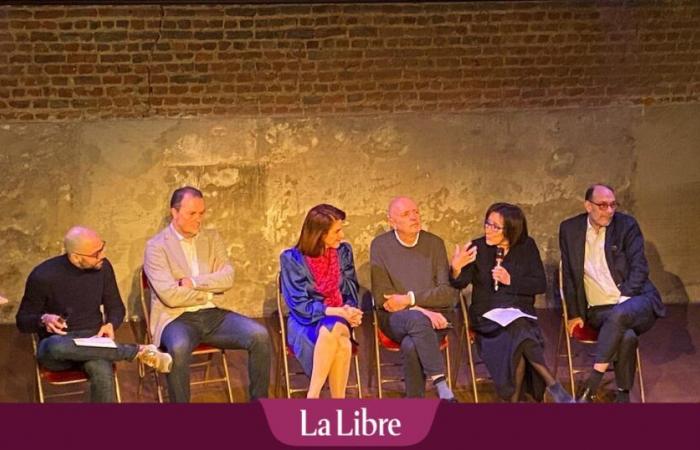Nearly a year later, the Universalists responded to the expectations of its initiator Djemila Benhabib: the movement “acted and influenced the collective debate”. The most glaring example is the ongoing debate on the influence of Islamism within schools. Thus, the manifesto of the Universalists is positively mentioned in the work Allah has nothing to do in my class, which, in large part, sparked this political discussion. It was also the Universalists who allowed worried teachers to “religious entryism into schools” to meet the Minister of Education Valérie Glatigny (MR) and who inspired her with several avenues of reflection before she presented, this winter, her plan to combat radicalism at school.
In mid-December, Marc Uyttendaele took part in an evening of discussions organized by the Jean Gol Center (the MR design office) on this same question. He was not presented there as one of the executives of the Universalists, but he carried the line and the voluntarism of the movement.
Several elected officials from different parties are launching a universalist and anti-communitarian movement: “Will we make it a political party? We don’t know.”
For exclusive neutrality
Because the Universalists, this is their first characteristic, avoid neither the battle of ideas nor the designation – by name – of their adversaries. During their first year of existence, they mainly occupied the school grounds.threatened by Islamism”.
To lead this fight, they are campaigning for the inclusion of neutrality in the Constitution, and are fighting against the wearing of signs of conviction within public authorities, administration and public education. Their conception of neutrality – this is a second of their characteristics – can be qualified “d’exclusive”. Religious freedom is not denied, but religions cannot intervene in the public sphere. This is why neither teachers nor administration staff can wear signs of conviction. The Universalists campaign in this sense for neutrality “in fact and in appearance”. Apart from such a conception of neutrality, there is no salvation for living together, they suggest.
“A war machine”
On this point, the movement says it meets “adversaries”. Djemila Benhabib and Marc Uyttendaele notably accuse Unia (the independent interfederal public institution which fights against discrimination and promotes equality) of “participate in the unraveling of neutrality” by promoting a more flexible conception of it.
If we look at its work, Unia considers that the neutrality of public services is a “essential principle”but that it must be combined with the principle of freedoms of thought, conscience, religion, expression… However, the restriction of a freedom (not wearing signs of conviction, for example) must be conceived as a exception, and not as a general rule. Furthermore, in Unia’s eyes, the principle of neutrality of a service does not systematically require neutrality of appearance. The differences are therefore real between Unia and the Universalists.
The school is faced with identity, community and religious threats. Let the political world act!
Beyond that, Marc Uyttendaele spoke in front of the Jean Gol Center (and confirmed it in an interview) about the existence in Belgium “of a war machine in permanent action”flooding doctrine and legal journals, and pleading for inclusive neutrality (a neutrality more conciliatory with the expression of convictions). This “combat pole” would be embodied by constitutionalists from Saint-Louis University and ULB. Near The FreeDjemila Benhabib agrees, regretting the influence in Belgium of an Anglo-Saxon legal school promoting the rights of individuals, in defiance of the collective rules essential in a rule of law.
Co-director of the Saint-Louis Constitutional Research Center, Mathias El Berhoumi judges these remarks “amazing” (“we are not part of an activist approach”), “little nuanced”, “on the verge of conspiracy” (“we rarely all agree among colleagues”) et “ignorant of Belgian constitutional history”. “Ouihe admits, the majority legal discourse in Belgian universities protects the individual, but it does so in the wake of the Constitution and the European Convention on Human Rights. It is therefore not the result of a recent fashion. Furthermore, Belgian history demonstrates that exclusive neutrality is not the only guarantor of civic life. The principle of Belgian-style pluralism which governs relations between the State and the faiths does not deny affiliations, while aiming for constitutional neutrality: the subsidizing of Catholic education is an example.”
The reception of the MR
The existence of the Universalists (who claim 2,500 signatories to their manifesto) illustrates a tight ideological conflict within academic, legal or associative bodies, regarding the neutrality of the State. “Everyone can define this notion in their own way and Belgium has never made a clear choice between inclusive neutrality and exclusive neutrality”underlines Marc Uyttendaele. The Universalists therefore intend to weigh in on this debate by promoting a sort of French-style secularism. For now, it is from the MR (and Défi) that they receive the warmest welcome. A paradox for Djemila Benhabib and Marc Uyttendaele, who call themselves left-wing. But they intend to continue their fight, expand it to other sections of society, and awaken their left. To be continued.






